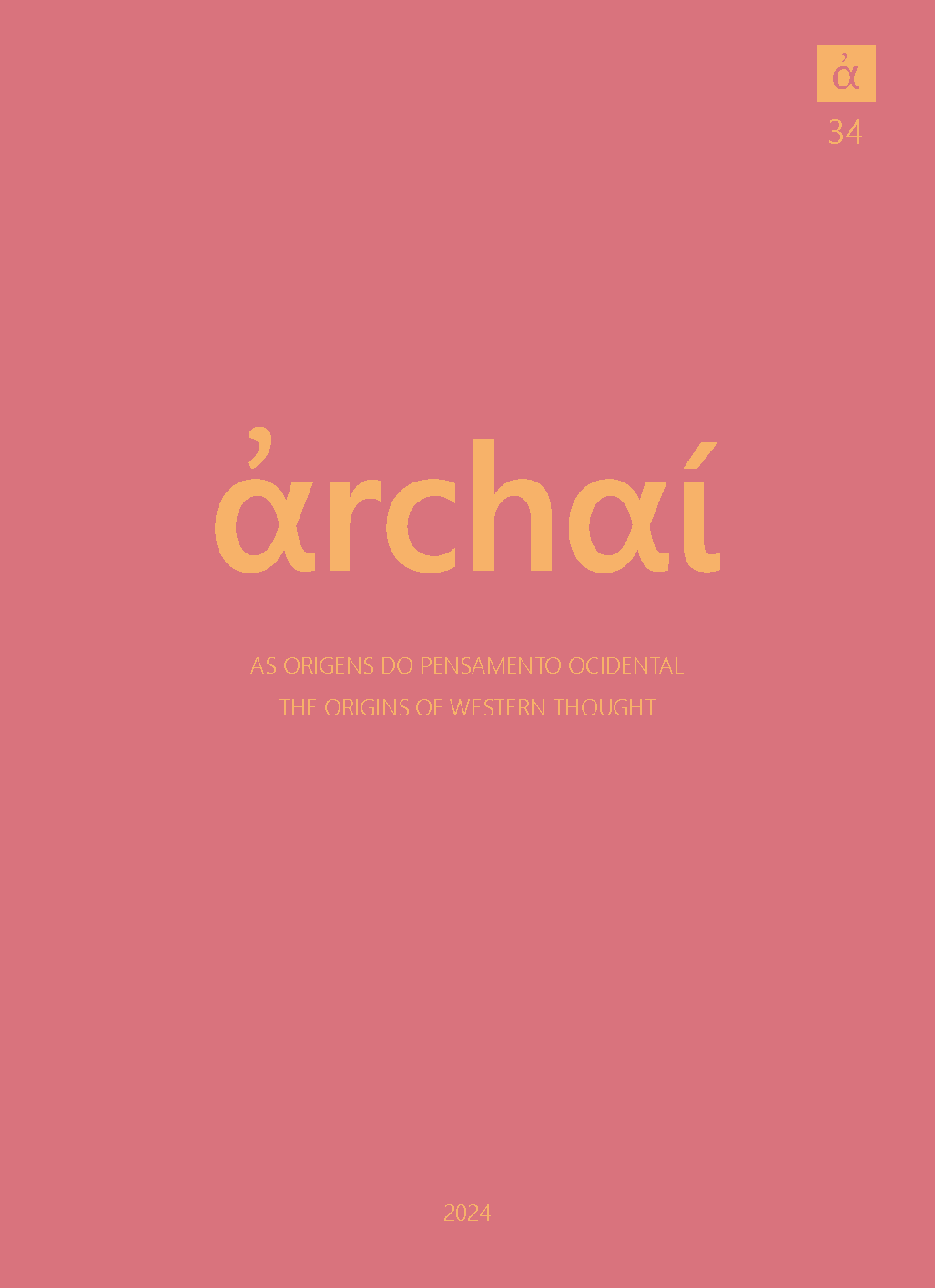The poetic performance of philosophical discourse
DOI:
https://doi.org/10.14195/1984-249X_34_16Keywords:
Discourse, Performance, Speech Acts, PlatoAbstract
As from the perspective of a extensive research about what is specific to the philosophical discourse, we intend to demonstrate, in this paper, the necessary performative condition of philosophy in its origin. The concept of 'performance' is used here to establish an approximation between the poetics of the Greek aedos, studied in the first section, and the matrix of philosophical investigation on performative statements initiated by J. L. Austin, comprehended as decisive for the understanding of speech acts and the declarative statements in them communicated. From the focus of this approach, Plato's Dialogue takes on, through the dramatization of Socrates' original speech, the indication of the necessary philosophical concern with speech situations (appropriate to any true reflection on what utterances actually say) and simultaneously the condition that philosophical reflection itself happens due to the poetics of the act of telling the truth understood as a purgative effect of self-examination. In other words, philosophical discourse needs to be conceived, since the paradigm of Platonic Dialogue, as capable of carrying out the performance of self-examination as a work of reflection on acts and their contexts of speech, whose ethical, political and educational interest is the ultimate purpose of all analysis.
References
ALENCAR, M. (2021). A filosofia de Sócrates: o cuidado de si como exercício da excelência São Paulo, Pimenta Cultural.
AUSTIN, J. L. (1990). Quando dizer é fazer Trad. Danilo Marcondes. Porto Alegre, Artes Médicas.
BENSON, H. (2002). Problems with Socratic Method. In: SCOTT, G. A. (ed). Does Socrates have a method? Rethinking the elenchus Pennsylvania, The Pennsylvania State University Press, p. 101-113.
BRANDÃO, J. L. (2015). Antiga Musa: Arqueologia da ficção 2ª ed. Belo Horizonte, Relicário.
BURNET, J. (ed.) (1903) Plato. Platonis Opera Oxford University Press.
BURNYEAT, M. (1997). First Words: A valedictory lecture. Proceedings of the Cambridge Philological Society, 43, p. 1-20.
BUTLER, J. (2021). Discurso de ódio: uma política do performativo Trad. Roberta Viscardi. São Paulo, Unesp.
COLLI, G. (1998). O nascimento da filosofia Campinas, Editora da Unicamp.
CORNFORD, F. M. (1952). Principium Sapientia: The origins of greek philosophical thought Cambridge, Cambridge University Press.
DETIENNE, M. (2013). Mestres da verdade na Grécia Arcaica Trad. Ivone Benedetti. São Paulo, Martins Fontes.
DIOGENES LAERTIUS. Lives of Eminent Philosophers HICKS, R. D. (1972) (ed). Disponível em: Disponível em: http://www.perseus.tufts.edu/hopper/collection?collection=Perseus:collection:Greco-Roman Acessado em 14/04/2024.
» http://www.perseus.tufts.edu/hopper/collection?collection=Perseus:collection:Greco-Roman
FOUCAULT, M. (2013). A verdade e as formas jurídicas Trad. Eduardo Jardim e Roberto Machado. 4ªed. Rio De Janeiro, Nau & PUC-Rio.
FREGE G. (2009). Lógica e Filosofia da Linguagem Seleção, introdução, tradução e notas de Paulo Alcoforado. 2ªed. São Paulo, Unesp .
GIANNANTONI, G. (2005). Diálogo socrático e nascita della dialettica nella filosofia di Platone Edição póstuma por Bruno Centrone. Nápoles, Bibliopolis.
GONZALEZ, F. J. (ed.) (1995). The Third Way: New Directions in Platonic Studies Boston, Rowman & Littlefield Publishers, Inc.
LOPES, D. R. (org.) (2022). Platão. Eutífron, Apologia de Sócrates e Críton Introdução e notas de Daniel Lopes. Trad. Daniel Lopes e Francisco Barros (Eutífron). São Paulo, Perspectiva.
MILLER, A. (2010). Filosofia da Linguagem Trad. Evandro Gomes e Christian Maillard. São Paulo, Paulus.
NIETZSCHE, F. (2020). Introdução ao estudo dos diálogos de Platão Trad. Marcos Sinésio e Francisco Moraes. São Paulo, Martins Fontes .
NUNES, C. A. (2011). Platão. Fedro (tradução e introdução). 3ªed. Belém, EDUFPA.
PEREIRA, M. H. R. (2007). Platão. República (tradução, introdução e notas). 10ª ed. Lisboa, Calouste Gulbenkian.
PINHEIRO, P. (2015). Aristóteles. Poética (tradução, introdução e notas). São Paulo, Editora 34.
RIBEIRO JR. W. (ed.) (2010). Hinos homéricos (tradução, notas e estudo). São Paulo, Ed. UNESP.
RICOEUR, P. (1976). Interpretation Theory: Discourse and the surplus of meaning Texas, Christian University Press.
ROSSETTI, L. (2015). O diálogo socrático Trad. Janaína Mafra. São Paulo, Paulus.
STEGMÜLLER, W. (2012). A Filosofia Contemporânea: Introdução Crítica. 2ªed. Trad. Adaury Fiorotti et. al Rio de Janeiro, Forense Universitária.
TORRANO, J. A. A. (1995). Hesíodo. Teogonia (tradução, introdução e notas). São Paulo, Iluminuras.
VLASTOS, G. (1993). Socratic Studies Cambridge, Cambridge University Press .
VOEGELIN, E. (2009). Ordem e História Vol. 2. Trad. Luciana Pudenzi, São Paulo, Loyola.
Downloads
Published
Issue
Section
License
Copyright (c) 2024 Cesar de Alencar

This work is licensed under a Creative Commons Attribution 4.0 International License.
Given the public access policy of the journal, the use of the published texts is free, with the obligation of recognizing the original authorship and the first publication in this journal. The authors of the published contributions are entirely and exclusively responsible for their contents.
1. The authors authorize the publication of the article in this journal.
2. The authors guarantee that the contribution is original, and take full responsibility for its content in case of impugnation by third parties.
3. The authors guarantee that the contribution is not under evaluation in another journal.
4. The authors keep the copyright and convey to the journal the right of first publication, the work being licensed under a Creative Commons Attribution License-BY.
5. The authors are allowed and stimulated to publicize and distribute their work on-line after the publication in the journal.
6. The authors of the approved works authorize the journal to distribute their content, after publication, for reproduction in content indexes, virtual libraries and similars.
7. The editors reserve the right to make adjustments to the text and to adequate the article to the editorial rules of the journal.



